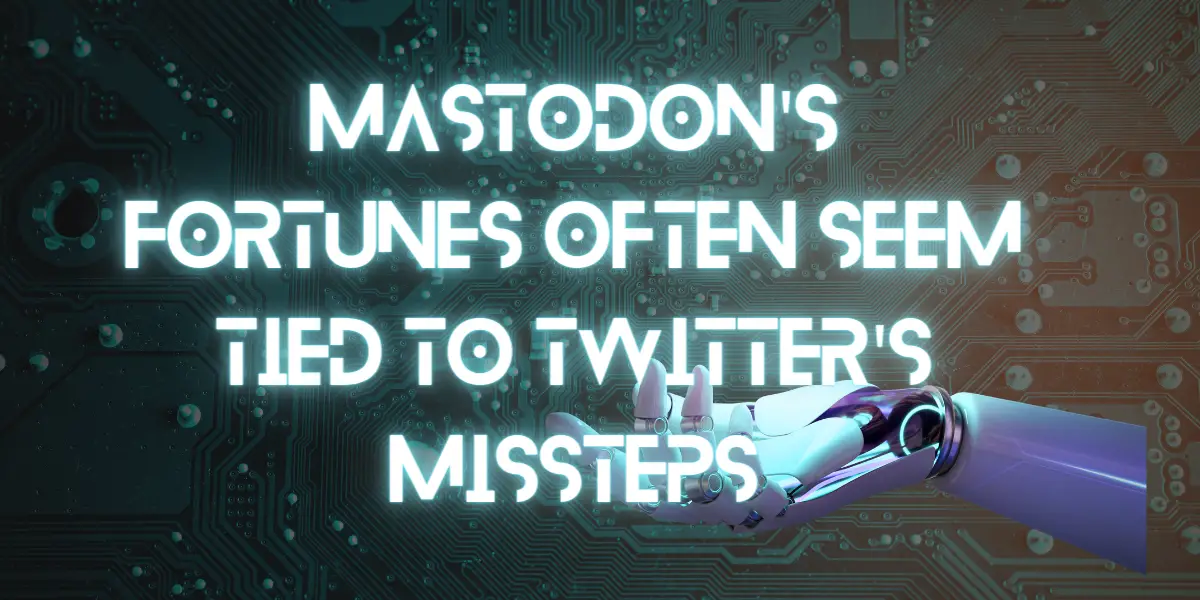Mastodon's Fortunes Often Seem Tied to Twitter's Missteps

In the ever-evolving landscape of social media, the fortunes of platforms often rise and fall in relation to each other. One such example is the relationship between Twitter and its open-source rival, Mastodon. As Twitter has stumbled, Mastodon has often benefited, seeing its user numbers surge. However, the decentralized nature of Mastodon has also led to significant challenges, particularly in content moderation.
Table of Contents
What is Mastodon?
Mastodon is a decentralized social network, meaning it is not controlled by a single entity. Instead, it is made up of various independently run communities, or “instances”, each with its own rules and moderation policies. This structure has been hailed as more democratic and open than the centralized models of platforms like Twitter and Facebook. However, it also presents unique challenges, particularly when it comes to moderating content.
Key Features of Mastodon
- Decentralization: Unlike traditional social media platforms, Mastodon is decentralized. This means that it is made up of various independently run communities, each with its own rules and moderation policies.
- Open Source: Mastodon is open source, meaning its code is freely available for anyone to use, modify, and distribute.
- Privacy: Mastodon places a strong emphasis on privacy. Users can choose who sees their posts, and there are no ads or tracking.
- Community Control: Each Mastodon community, or “instance”, is independently run and sets its own rules and moderation policies.
How to login Mastodon?
- Visit the Mastodon website or download the Mastodon app.
- Choose an instance. Remember, each instance has its own rules and community, so choose one that aligns with your interests and values.
- Sign up for an account. You’ll need to provide a username and password, and verify your email address.
- Once you’ve verified your email, you can log in to Mastodon using your username and password.
How to Use Mastodon?
- Once you’re logged in, you can start exploring. The Mastodon interface is similar to other social media platforms, with a feed of posts from people you follow.
- To post something, simply type your message into the box at the top of the screen and click “Toot”.
- You can also reply to others’ posts, or “boost” them to share them with your followers.
- Remember, each Mastodon instance has its own rules, so be sure to familiarize yourself with them.
Application of Mastodon
- Alternative Social Media: For those dissatisfied with traditional social media platforms, Mastodon offers an alternative with more user control and privacy.
- Community Building: The decentralized nature of Mastodon makes it great for building specific communities around shared interests or values.
- Free Speech: Mastodon’s emphasis on user control and community moderation makes it a platform where free speech can thrive.
The number of Mastodon users has surged
Mastodon’s user numbers have seen significant growth, particularly in relation to Twitter’s missteps. Following Twitter’s acquisition by Elon Musk and subsequent controversial changes, many users sought alternatives, leading to a surge in Mastodon’s user numbers. As of July 2023, Mastodon boasts 2.1 million monthly active users.
Mastodon's fortunes often seem tied to Twitter's missteps
The fate of Mastodon often seems tied to Twitter’s missteps. As Twitter has stumbled, whether through controversial acquisitions, policy changes, or branding decisions, Mastodon has often benefited. This relationship underscores the interconnected nature of the social media landscape, where the fortunes of one platform can directly impact others.
Mastodon full of child abuse content?
However, Mastodon’s decentralized nature has led to significant challenges, particularly in content moderation. A recent report from Stanford found over 600 pieces of known or suspected child abuse material on Mastodon over a two-day period. This raises serious questions about the effectiveness of safety efforts on decentralized platforms.
Also read:How Long does the Bluesky Waitlist Take?How to Get on Bluesky Waitlist?
Conclusion
Mastodon’s fortunes are a testament to the dynamic nature of the social media landscape. As an open-source, decentralized alternative to traditional platforms, it offers unique benefits but also faces significant challenges. Its growth in relation to Twitter’s missteps highlights the interconnectedness of social media platforms, while its struggles with content moderation underscore the0 difficulties of decentralization. As Mastodon continues to evolve, it will be interesting to see how it navigates these challenges and opportunities.

